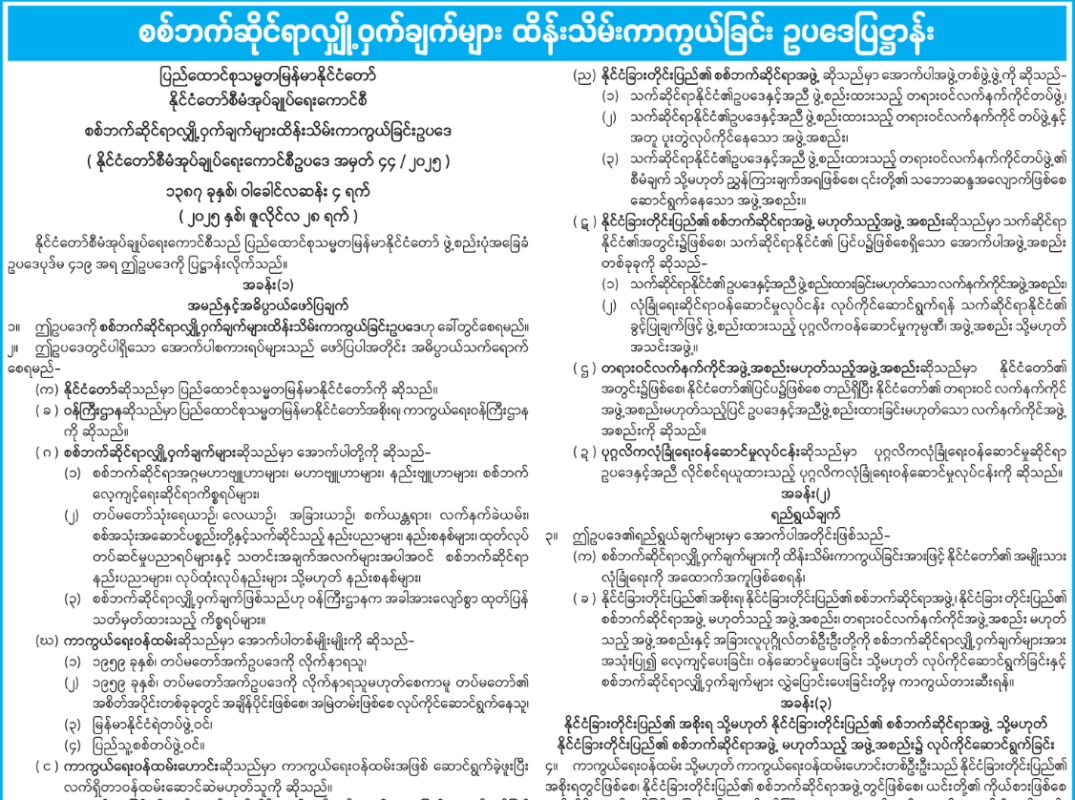Understanding Myanmar’s Military Secrets Protection Law (2025)

1199

Phyo Lin Aung (NP News) - Aug 5
Regarding the Military Secrets Protection Law issued by the State Administration Council (SAC) on July 28, 2025, opponents are routinely spreading inaccurate and misleading information. Such writings have made the law controversial among ordinary citizens who do not have a thorough understanding of its provisions.
Purpose and scope of the law
The law primarily aims to protect military grand strategies, tactics, and matters related to military training, as well as technologies and technical systems concerning naval vessels, aircraft, other vehicles, machinery, weapons, ammunition, and military equipment used by the Tatmadaw. It also covers production and installation techniques, military technologies, procedures or systems, and other related matters officially designated as military secrets by the Ministry of Defense.
The objectives of this law are to contribute to national security by safeguarding military secrets and to prevent the training, assistance, or involvement in the use of such secrets by foreign governments, foreign military organizations, non-military foreign organizations, unauthorized armed groups, or individuals. It also aims to prevent the exchange or transfer of these secrets to such entities.
Who does the law apply to?
Although this law is primarily intended for defense personnel, anyone who uses any military secret for personal gain is subject to the penalties provided under this law. The newly enacted Military Secrets Protection Law consists of six chapters and 23 sections.
The law defines a defense personnel as: (1) a person subject to the Tatmadaw Act, 1959; (2) a person not subject to the Tatmadaw Act but serving part-time or permanently in any part of the Tatmadaw; (3) a member of the Myanmar Police Force; (4) a member of the People's Militia. A "former defense personnel" refers to someone who previously served in one of these roles and is no longer active.
Although the law focuses on these groups, Section 20 specifies that, notwithstanding any existing law, any person who commits an offense under this law shall be prosecuted under it. Therefore, its scope extends to all individuals.
Thus, the first point to be emphasized is that this law does not concern only defense personnel, it affects the entire nation.
Clarifying the death penalty concern
The provision for the death penalty under this law has been exaggerated and sensationalized. While the maximum penalty is indeed death, there are numerous recent examples that show how breaches of military security can endanger everyone.
In the post-2021 period, along with the civil disobedience movement, defense personnel, including soldiers, police, and other employees, went on strike without going to work, and some even handed over military secrets to the rebels. As a result, security was breached, unnecessary loss of life occurred, and sovereign territory fell into the hands of rebel groups.
Exiled media outlets have focused heavily on the death penalty in their reports, often drawing conclusions without referencing the actual provisions of the law.
Section 4 states that no defense personnel or former defense personnel shall work for or on behalf of a foreign government or a foreign military organization unless officially assigned or granted permission by the Ministry.
Section 5 similarly prohibits defense personnel or former personnel from working for any foreign organization.
The "Crimes and Punishments" chapter outlines penalties for violations. Section 12 states that anyone convicted of violating Sections 4 or 5 shall be punished with life imprisonment or the death penalty. Section 13 adds that any defense personnel convicted of violating Section 7 shall face the same penalties.
Section 7 prohibits current defense personnel from using military secrets to work in any organization that is not a legitimate armed group or private security service, inside or outside the country. Section 8 similarly restricts former defense personnel from doing so.
Section 14 provides that any former defense personnel found guilty of violating Section 8(a) shall be sentenced to life imprisonment or death.
Therefore, appropriate punishment will only be imposed following a conviction and depending on the gravity of the offense. The claim that "former defense personnel can be sentenced to death or life imprisonment simply for working as security personnel" is completely inaccurate.
The law also stipulates that a former defense personnel who wishes to work in private security must apply for permission from the Ministry. They may not do so without official authorization and must comply with all relevant conditions once granted.
Section 21 further provides that any former defense personnel already working in private security before the law came into effect must apply for permission within six months from the law's enactment.
Regional and international context
In ASEAN, Myanmar is the only country to have recently enacted a specific Military Secrets Protection Law. However, other countries in the region have similar legal frameworks. Thailand has its Internal Security Act and Armed Forces Acts, and Vietnam enforces the Law on Protection of State Secrets. While these countries may not have identical laws, they do impose the death penalty in cases of espionage or treason involving military secrets.
Even the United States allows for the death penalty in certain severe cases involving espionage or military secrets. Under the Espionage Act of 1917 specifically Article 106 of the Uniform Code of Military Justice, the death penalty can be applied if the act of espionage occurs during wartime and the offender knowingly delivers intelligence to the enemy.
Given that Myanmar faces multiple threats from ethnic armed groups and terrorism, safeguarding military secrets is a top priority. Any leak of sensitive military information could lead to catastrophic losses in national defense, lives, and sovereignty.